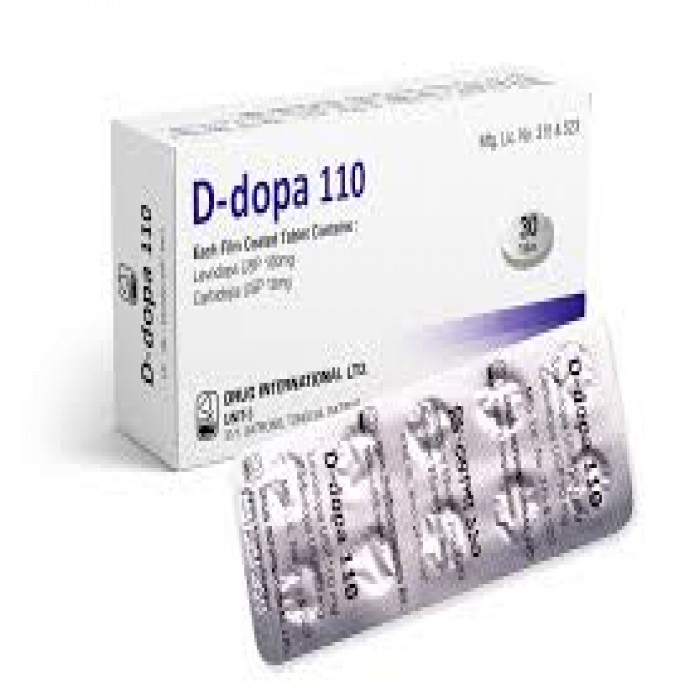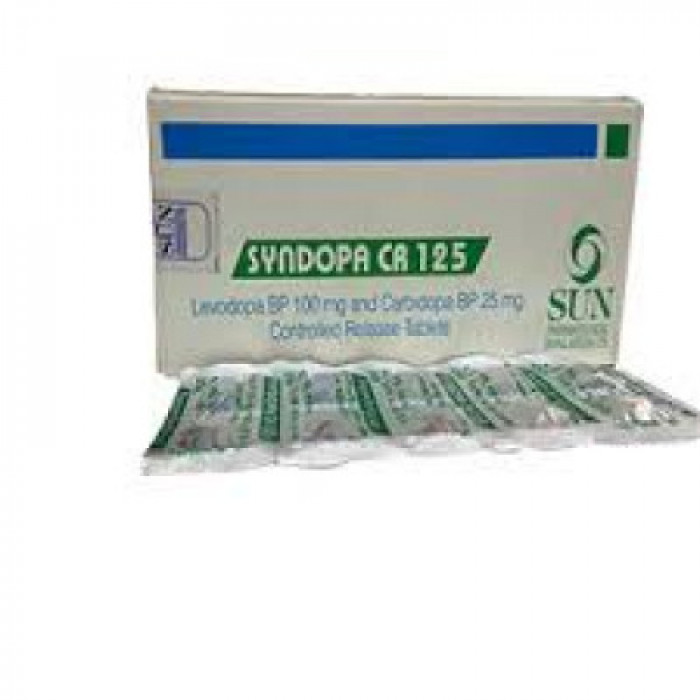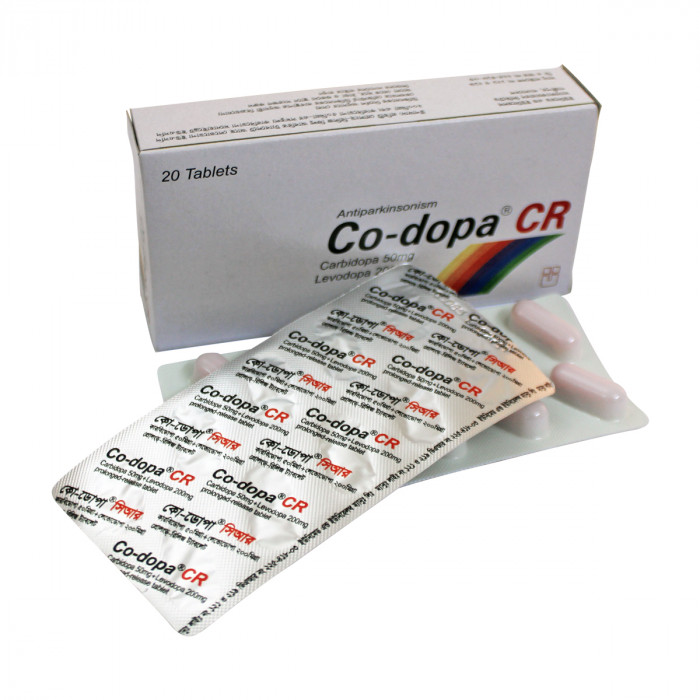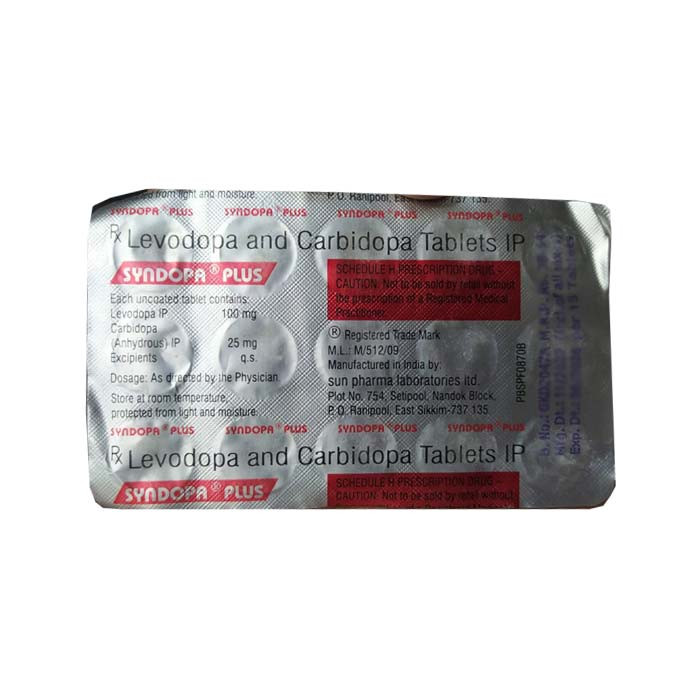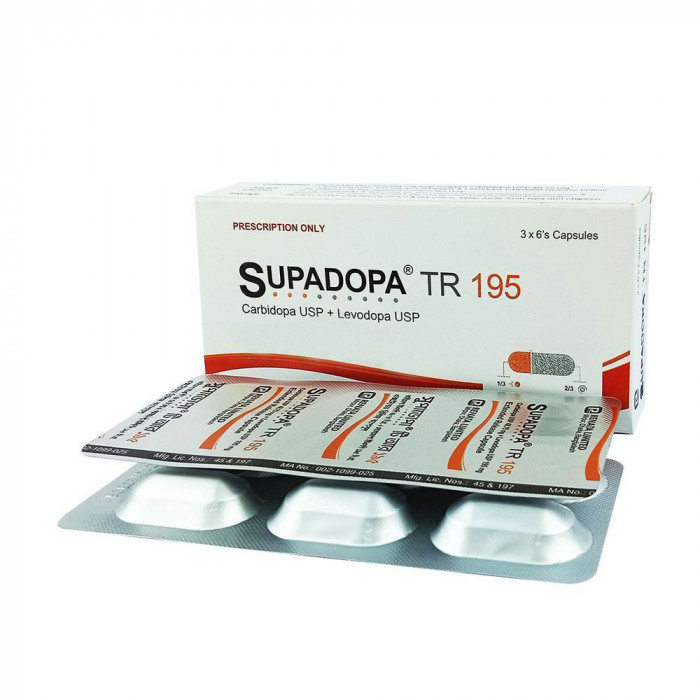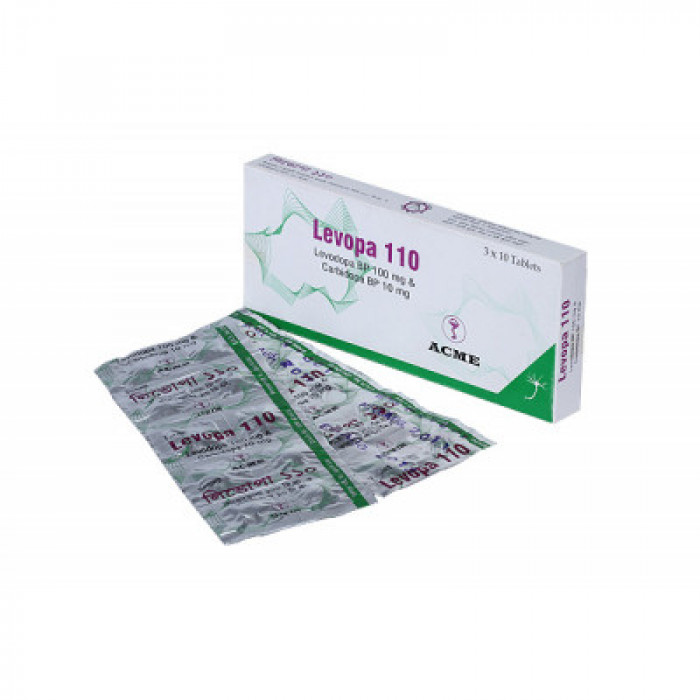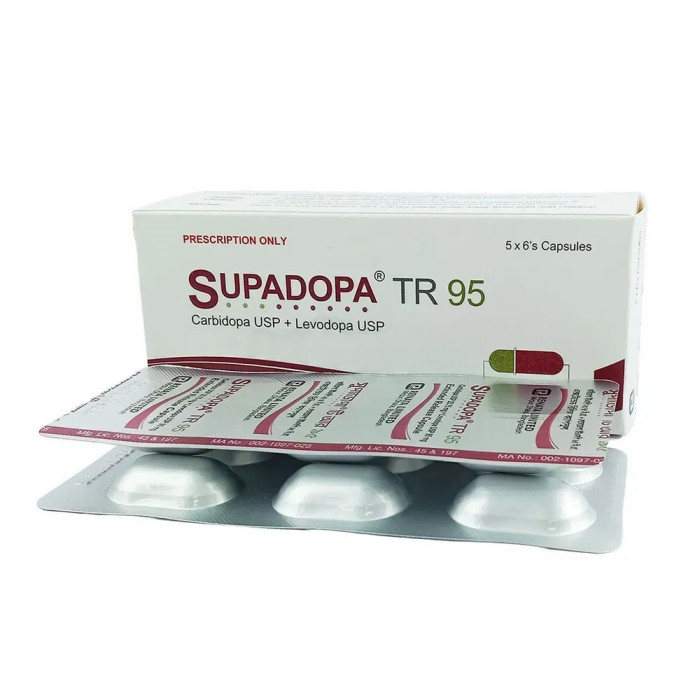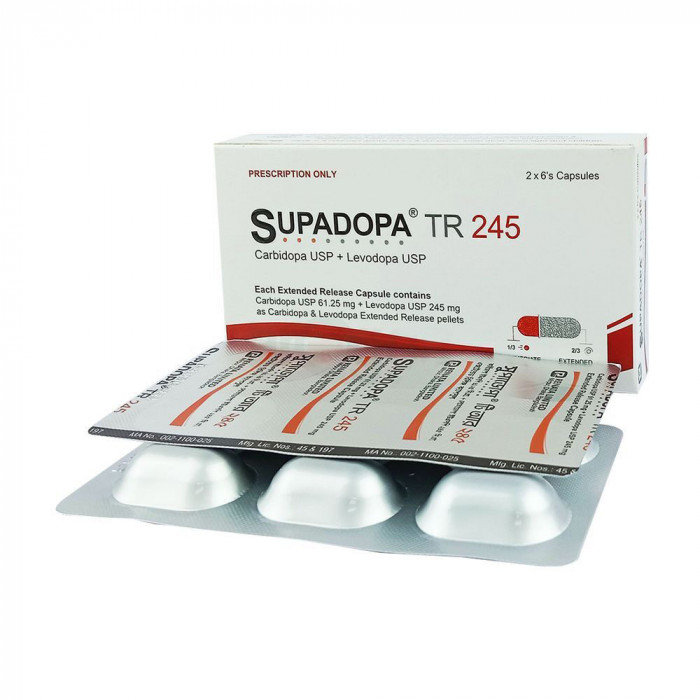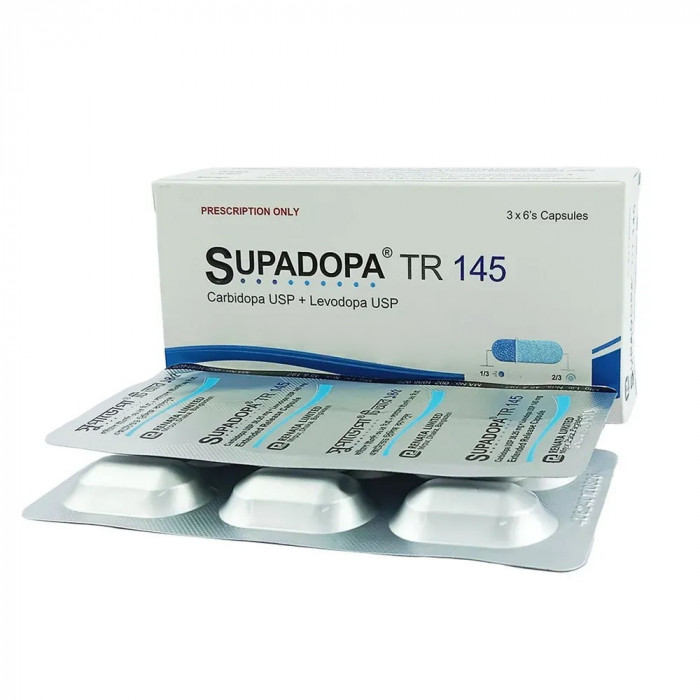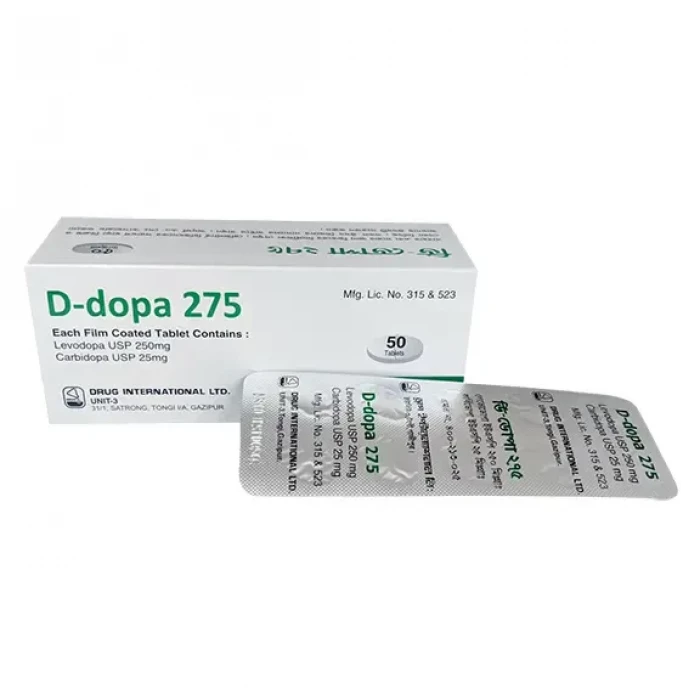
✔ 100% Authentic Product
👁️ Currently Viewing 2727
D-Dopa 275mg Tablet 10pcs
D-Dopa 275 is a combination of Levodopa and Carbidopa used to treat Parkinson’s disease. It helps relieve symptoms such as tremors, muscle stiffness, and difficulty moving.
Discount
Price: ৳ 66
MRP:
৳
70
6%
Off

100% Genuine Products, Guaranteed

Safe & Secure Payments, Always

Fast, Secure & Efficient Delivery

Proper Packaging
 Cash on Delivery - All over Bangladesh
Cash on Delivery - All over Bangladesh Regular Delivery - 12-24 Hours, Dhaka City* Charge Tk.39-59
Regular Delivery - 12-24 Hours, Dhaka City* Charge Tk.39-59 Regular Delivery - 24-48 Hours, Other Cities* Charge Tk.99-110
Regular Delivery - 24-48 Hours, Other Cities* Charge Tk.99-110
 ফ্রি ডেলিভারিঃ - ৯৯৯ টাকা+ অর্ডারে, ঢাকা
শহরে
ফ্রি ডেলিভারিঃ - ৯৯৯ টাকা+ অর্ডারে, ঢাকা
শহরে ফ্রি ডেলিভারিঃ - ২৯৯৯ টাকা+ অর্ডারে, ঢাকার
বাহিরে
ফ্রি ডেলিভারিঃ - ২৯৯৯ টাকা+ অর্ডারে, ঢাকার
বাহিরে
100% Genuine Products, Guaranteed
Safe & Secure Payments, Always
Fast, Secure & Efficient Delivery
Proper Packaging
 Cash on Delivery - All over Bangladesh
Cash on Delivery - All over Bangladesh Regular Delivery - 12-24 Hours, Dhaka City* Charge Tk.39-59
Regular Delivery - 12-24 Hours, Dhaka City* Charge Tk.39-59 Regular Delivery - 24-48 Hours, Other Cities* Charge Tk.99-110
Regular Delivery - 24-48 Hours, Other Cities* Charge Tk.99-110 ফ্রি ডেলিভারিঃ - ৯৯৯ টাকা+ অর্ডারে, ঢাকা
শহরে
ফ্রি ডেলিভারিঃ - ৯৯৯ টাকা+ অর্ডারে, ঢাকা
শহরে ফ্রি ডেলিভারিঃ - ২৯৯৯ টাকা+ অর্ডারে, ঢাকার
বাহিরে
ফ্রি ডেলিভারিঃ - ২৯৯৯ টাকা+ অর্ডারে, ঢাকার
বাহিরে
✅ Description:
D-Dopa 275mg Tablet is a combination medicine containing Levodopa and Carbidopa. It is primarily used to treat the symptoms of Parkinson's disease and Parkinson's-like symptoms associated with other conditions. These symptoms, such as tremors, stiffness, and slowness of movement, are often caused by a deficiency of dopamine in the brain.
D-Dopa 275mg Tablet works by increasing the action of dopamine, a crucial chemical messenger involved in controlling information transfer in the brain. Levodopa is converted to dopamine in the brain, while Carbidopa prevents its breakdown before it reaches the brain, thus enhancing dopamine levels.
- This medicine may cause dizziness and sleepiness. Therefore, it's advisable to avoid driving vehicles or operating machinery after taking D-Dopa 275.
- If you are allergic to any of the components of this medicine, do not take it.
- D-Dopa 275 should only be taken under the guidance of a doctor and according to the prescribed dosage.
- Do not discontinue the medicine without consulting your doctor, as stopping abruptly may lead to recurrence or worsening of symptoms.
- Inform your doctor about any other medications you are taking to avoid potential interactions.
- D-Dopa 275 should not be used in children below 12 years of age.
- Inform your doctor if you are pregnant, planning a pregnancy, or breastfeeding before using this medicine.
Safety Advices

Alcohol
UNSAFE
It's unsafe to consume alcohol with D-Dopa 275 as it can increase the risk of side effects like dizziness and drowsiness.

Pregnancy
CONSULT YOUR DOCTOR
D-Dopa 275 may be unsafe to use during pregnancy. Limited human studies suggest potential harm to the developing baby. Consult your doctor for advice.

Breastfeeding
CONSULT YOUR DOCTOR
While D-Dopa 275 is probably safe to use during breastfeeding, it may cause partial to complete suppression of lactation. Consult your doctor for guidance.

Driving
UNSAFE
D-Dopa 275 may cause dizziness, drowsiness, and double vision, which can affect your ability to drive or operate machinery. Exercise caution.

Kidney
CAUTION
D-Dopa 275 is likely safe to use in patients with kidney disease, but caution is advised. Consult your doctor for personalized advice.

Liver
CAUTION
Use D-Dopa 275 with caution in patients with liver disease. Dose adjustment may be necessary. Consult your doctor for guidance.
✔️ Uses of D-Dopa 275mg Tablet
- Parkinson's Disease
✔️ Composition:
LEVODOPA+CARBIDOPA
✔️ How does D-Dopa 275mg Tablet work?
Levodopa is converted to dopamine in the brain, while Carbidopa prevents its breakdown before reaching the brain, increasing dopamine levels.
✔️ Side Effects of D-Dopa 275mg Tablet
Common side effects of D-Dopa 275mg Tablet include nausea, fatigue, constipation, hallucinations, and dry mouth. If these side effects persist or significantly bother you, consult your doctor for advice.
✔️ Quick Suggestions:
- Take as prescribed.
- Avoid high-protein meals.
- Be cautious while driving.
- Rise slowly to prevent dizziness.
- Do not stop abruptly.
- Inform your doctor about other medications.
- Inform your doctor if pregnant, planning pregnancy, or breastfeeding.
✔️ Indications of D-Dopa 275mg Tablet
Parkinson's disease is indeed a neurological disorder that primarily affects movement. It occurs due to the loss of dopamine-producing nerve cells in a specific part of the brain called the substantia nigra. As dopamine levels decrease, it leads to symptoms such as tremors, stiffness, slowness of movement, and difficulty with balance and coordination.
D-Dopa 275mg Tablet, containing a combination of Levodopa and Carbidopa, is commonly prescribed to manage the symptoms of Parkinson's disease. Levodopa is converted into dopamine in the brain, replenishing the depleted dopamine levels, while Carbidopa prevents the breakdown of levodopa outside the brain, enhancing its effectiveness and reducing side effects. This medication helps alleviate the symptoms associated with Parkinson's disease, improving the quality of life for those affected by the condition.
✔️ Pharmacology
Levodopa acts as a precursor to dopamine, a neurotransmitter involved in various brain functions, including movement control. However, when taken orally, levodopa can be converted into dopamine outside the brain by an enzyme called decarboxylase, leading to side effects and reducing the amount of levodopa reaching the brain.
Carbidopa, on the other hand, inhibits this peripheral conversion of levodopa to dopamine, allowing more levodopa to cross the blood-brain barrier and be converted to dopamine in the brain, where it's needed most. This combination of levodopa and carbidopa helps to alleviate the symptoms of Parkinson's disease more effectively while reducing side effects associated with peripheral dopamine conversion.
✔️ Dosage & Administration of D-Dopa 275mg Tablet
For patients starting with the 250 mg/25 mg tablet:
- Initial Dosage: Begin with one-half tablet taken once or twice daily. However, this may not provide the optimal amount of Carbidopa required by many patients.
- Titration Upward: If necessary, add one-half tablet every day or every other day until the optimal response is achieved. For most patients taking more than 1500 mg of Levodopa a day, the suggested starting dosage is one tablet of 250 mg/25 mg three or four times a day.
Therapy should be individualized and adjusted based on the desired therapeutic response. When more Levodopa is required, the 250 mg/25 mg tablet should be substituted at a dosage of one tablet three or four times a day. If necessary, the dosage of the 250 mg/25 mg tablet may be increased by half to one tablet every other day, up to a maximum of eight tablets a day. However, experience with a total daily dosage greater than 200 mg of Carbidopa is limited.
Take D-Dopa 275mg Tablet as advised by your physician. Swallow the medicine as a whole and do not crush or chew the medicine. Continue to take D-Dopa 275mg Tablet unless your doctor tells you to stop because sudden withdrawal of D-Dopa 275mg Tablet can cause symptoms like mental changes, fever, and muscle tightness.
Your doctor will decide the correct dose and duration of D-Dopa 275mg Tablet for you depending on your age, body weight, and disease condition.
✔️ Interaction
Drug-Drug Interaction: Levodopa and Carbidopa may interact with other antiparkinson’s drugs (rasagiline, pramipexole), diuretics (furosemide), cholesterol-lowering drugs (atorvastatin), vitamins (pyridoxine), and antipsychotic drugs (quetiapine).
Drug-Food Interaction: Avoid high-protein foods such as chicken, beef, pork, eggs, and fish while taking Levodopa and Carbidopa, as they may reduce their effectiveness. Do not take vitamin supplements with Levodopa and Carbidopa unless prescribed by a doctor. Alcohol intake should also be avoided, as it may increase side effects like drowsiness, dizziness, or difficulty concentrating.
Drug-Disease Interaction: Inform your doctor if you have glaucoma, asthma, nausea, dizziness, mental illness, breathing problems, daytime sleepiness, or involuntary muscle movements before taking Levodopa and Carbidopa.
✔️ Contraindications
Carbidopa-Levodopa tablet is contraindicated in patients with hypersensitivity to Carbidopa and Levodopa and in patients with narrow-angle glaucoma. Since Levodopa may activate a malignant melanoma, Carbidopa-Levodopa should not be used in patients with suspicious undiagnosed skin lesions or a history of melanoma.
✔️ Pregnancy & Lactation
The safety of Carbidopa-Levodopa during human pregnancy is uncertain. While its effects on human pregnancy have not been fully studied, Levodopa and combinations of Carbidopa and Levodopa have been found to cause visceral and skeletal malformations in rabbits. Therefore, if a woman of childbearing potential is considering using Carbidopa-Levodopa, the potential benefits of the medication must be carefully weighed against the possible risks in case pregnancy occurs.
It is also unclear whether Carbidopa is excreted in human breast milk. Since many medications are excreted in breast milk and can potentially cause serious adverse reactions in infants, a decision should be made whether to discontinue breastfeeding or to discontinue the use of Carbidopa-Levodopa, taking into consideration the importance of the medication to the mother's health.
✔️ Precautions & Warnings
Before taking Levodopa and Carbidopa, inform your doctor about any medical history you have, including diabetes, heart attacks, mental illness, stomach ulcers, heart disease, or recent surgical procedures. This medication may cause lightheadedness, so it's advisable to avoid activities requiring mental alertness after taking it. Prolonged use of Levodopa and Carbidopa may increase the risk of neuropathy (nerve damage) and lower levels of vitamin B12 with increased methylmalonic acid levels. Caution is advised in patients with eye problems (narrow-angle glaucoma), irregular heartbeat (arrhythmia), gastrointestinal bleeding, and psychosis. Avoid taking Levodopa and Carbidopa if you are also using monoamine oxidase inhibitors (MAOIs) or certain antidepressant drugs (such as isocarboxazid, phenelzine, selegiline, and tranylcypromine), as it can lead to a hypertension crisis.
✔️ Storage Conditions:
Keep this medicine in the container or the pack it came in, tightly closed. Store it according to the instructions mentioned on the pack or label. Dispose of the unused medicine. Make sure it is not consumed by pets, children, and other people.
⚠️Disclaimer:
At ePharma, we’re committed to providing accurate and accessible health information. However, all content is intended for informational purposes only and should not replace medical advice from a qualified physician. Please consult your healthcare provider for personalized guidance. We aim to support, not substitute, the doctor-patient relationship.




